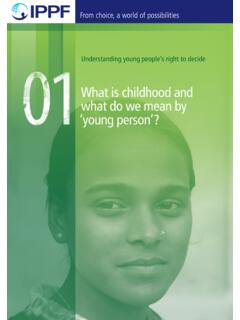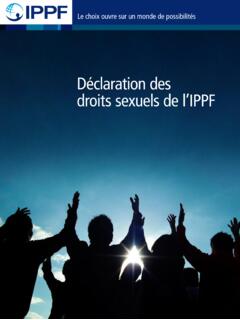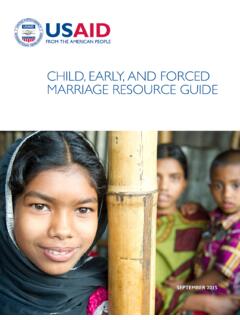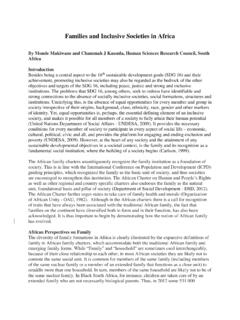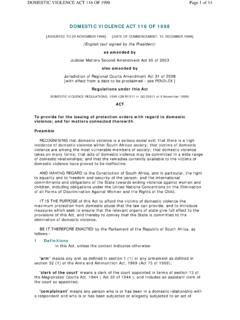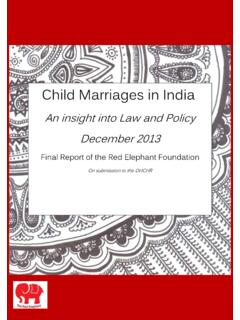Transcription of Harmful Traditional Practices - IPPF
1 All violations of women s and girls rights may be described as Harmful Practices , but there are particular forms of violence against women and girls which are defended on the basis of tradition, culture, religion or superstition by some community These are often known as Harmful Traditional Practices . Harmful Traditional Practices are largely carried out without the consent of the girl/woman involved and thus constitute a violation of human rights as set out in the Universal Declaration of Human Rights. As with all forms of violence against women and girls, Harmful Traditional Practices are caused by gender inequality including unequal power relations between women and men, rigid gender roles, norms and hierarchies, and ascribing women lower status in society.
2 Harmful Practices are referred to in the Convention on the Rights of the child (Article 24(3)), CEDAW (Articles 2, 5 and 16) and regional instruments. Harmful Traditional Practices constituting violence against women and girls can include: acid violence, breast flattening, cosmetic mutilation, dowry and bride price, early/forced marriage and marriage by abduction/rape, female genital mutilation/cutting (FGM/C), honour crimes, corrective rape, and female infanticide, ritual sexual slavery, virginity testing, Practices related to initiation or menstruation, some widowhood rituals and accusations of witchcraft levied at older In many countries there are specific laws aiming to curtail these Practices , in most instances they also contravene countries existing laws relating to physical and sexual violence.
3 Harmful Traditional Practices are a product of social norms which aim to uphold cultural ideas about gender roles and social relations. Many of these Practices , including acid violence and sex-selective abortion, have become common relatively recently but may be considered Harmful Traditional Practices as they are rooted in and upheld by such ideas. Where such Practices exist, there may be negative social sanctions which are experienced by individuals if the Harmful Traditional practice is not carried out. As a result, women themselves often play a role in perpetuating such violence.
4 Female genital mutilation/cutting (FGM/C) has long been defined as a Harmful Traditional FGM/C is the forcible removal of all or part of a girl's healthy genitalia, and is a human, women s and child s rights violation. It occurs in 28 countries in Africa, some countries in the Middle East and Asia, and in diaspora communities elsewhere. It can cause physical and psychological harm throughout the life of a cut woman. This includes haemorrhaging and shock at the time of the cut, problems with urination and menses, and obstetric Girls are usually cut before age 12, and FGM/C is often a precursor to early/ child marriage .
5 FGM/C persists because it is a social norm, linked with marriageability, which ensures that it continues, although the health consequences may be severe. Early and forced marriage : is any marriage of a child under the age of 185 without their consent and constitutes a violation of the Convention on the Rights of the child . Early and forced marriage happens globally but is most common in Africa and THE FACTS Alicia FieldHARMFUL Traditional PRACTICESAFFECTING WOMEN & GIRLS Southern Asia, and especially among the poorest, most rural communities.
6 UNICEF estimates that in Africa 42% of girls are married before the age of It likely leads to sexual activity for a girl at an age when she is neither physically nor sexually mature. Young brides may become pregnant at an early age; meaning they are more likely to die in childbirth and to experience obstetric Violence or murder related to dowry payment, which happens when new brides are hurt or killed by in-laws as a result of conflicts related to dowry. Some sources have estimated that as many as 25 000 newly married women are killed or maimed each year as a result of dowry-related Son preference: Sex selection is a clear manifestation of deeply entrenched gender discrimination and a symptom of pervasive social, cultural, political and economic injustices against women.
7 It occurs in many parts of South, East and Central Asia, where sex ratios of 130 boys born to every 100 girls have been reported. Such injustices must be addressed and resolved without exposing women and girls to the risk of death or serious injury through denying them access to needed services such as safe abortion and thus further violating their Honour crimes occur when a girl or woman is attacked or killed by or on behalf of a family member because of an actual or assumed transgression of certain gender social norms which are framed as sullying the honour of a partner, family member etc.
8 Activities which have been framed in this way include being sexually active, pregnancy outside of marriage or even being a victim of rape. It can be seen as a way of protecting family reputation or &PREFERRED LANGUAGEHARMFUL Traditional PRACTICESAFFECTING WOMEN & GIRLSREFERENCES1 OHCHR, Fact Sheet , Harmful Traditional Practices Affecting the Health of Women and Children. , accessed February The International NGO Council on Violence against Children, Violating Children s Rights: Harmful Practices based on tradition, culture or superstition,20123 OHCHR, Fact Sheet , Harmful Traditional Practices Affecting the Health of Women and Children.
9 , accessed February WHO, Fact sheet N 241: Female Genital Mutilation, 2013. accessed February 20135 UNICEF child Info, child marriage : Progress. January 2012 accessed February 20136 UNICEF, Early marriage : A Harmful Traditional Practice. 20057 UNFPA, child marriage Factsheet, 20058 Program for Appropriate Technology in Health, Strengthening understanding of femicide. Seattle. 2008. 9 OHCHR, UNFPA, UNICEF, UN Women and WHO, Preventing gender-biased sex selection: an interagency statement. 2011 10 Report of the Secretary-General on ending female genital mutilation, , 2011 International standards: Following the 2012 General Assembly adoption of the resolution entitled Intensifying global efforts for the elimination of FGM/C States should push for commitments at the CSW which focus on implementation of this resolution as part of a global response to ending violence against women, and using a holistic approach at the community level.
10 There are approaches leading to abandonment which address FGM/C as a social norm and lead to sustained social change, as stated in the UNSG s report to CSW 56 and at the 57th CSW this should be re-emphasised in seeking to operationalize the end of Language: The use of the word Traditional in the context of Harmful Traditional Practices has become very controversial in recent years, with some governments at CSW 55 seeking a deletion of the word Traditional . We advocate keeping the full term Harmful Traditional Practices as it acknowledges that these Practices are often defended on the basis of tradition, and are frequently social norms.
